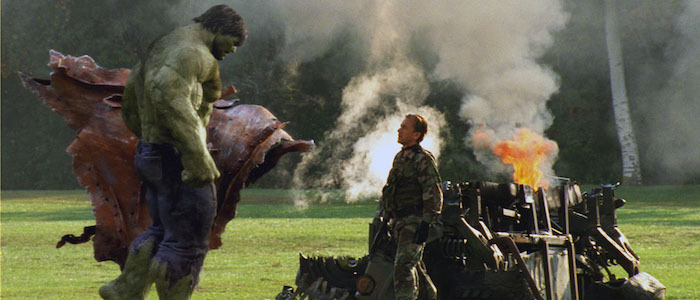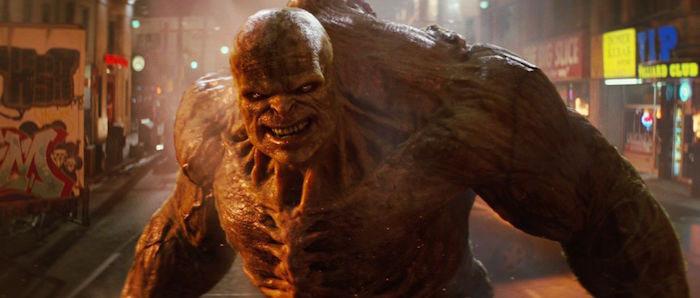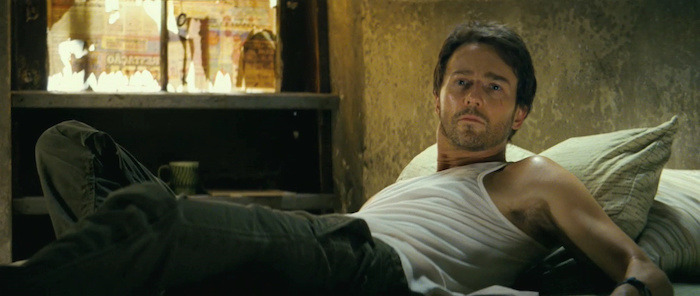'The Incredible Hulk,' Marvel's Forgotten Monster Movie, Is A Vital Piece Of The MCU
(Welcome to Road to Infinity War, a new series where we revisit the first 18 movies of the Marvel Cinematic Universe and ask "How did we get here?" In this edition: revisiting the oft-maligned and underrated The Incredible Hulk.)
It's easy to dismiss The Incredible Hulk when revisiting the Marvel Cinematic Universe. Striking it from canon seems to have few long-term narrative repercussions, and the recasting of Edward Norton's Bruce Banner in future films primes it all the more for being swept under the rug. However, it's an integral part of what the folks at Marvel were attempting to do in their early days, the then-unprecedented shared universe concept that now seems to be on every studio's mind. While the film has crossover references a-plenty, it's set apart from the rest of the MCU by its distinct tone, one that feel less "superhero movie" and more "classic monster picture," though the way it marries said tone to the now familiar Marvel sensibility helped build the platform from which The Avengers would be launched. Forgettable or not, the road to Infinity War would be incomplete without it.
A Dark Mirror to ‘Iron Man’
Just six weeks after Iron Man cleaned house at the global box office, The Incredible Hulk stormed into cinemas to slightly less enthusiastic fanfare. A mere five years out from Ang Lee's Hulk, a film The Incredible Hulk may as well have been softly rebooting, Louis Leterrier's monster picture didn't necessarily give audiences something they hadn't seen before. It did however use familiar language to nestle itself amidst the pieces of the growing Marvel puzzle. The film opens in lurid montage, with Craig Armstrong's unsettling opera scoring Bruce Banner's first transformation over the initial credits, cutting between rows of dimly lit "mad scientist" like X-rays and the first-person perspective of the Hulk itself, as the creature tears through both foes and loved ones.
Banner is at once Victor Frankenstein and Frankenstein's monster, only the angry townspeople in pursuit are, well, the U.S. Government. They refer to the Hulk as "the bogey" the same as they did when Iron Man intervened in the Middle Eastern town of Gulmira. And as the American military would go on to with Stark's technology in Iron Man 2, they want to seize and re-create the Hulk's power and weaponize it en masse. But like Iron Man, the hero whose politics are still in a questionable space, they too intervene in a foreign country in order to get a weapon out of what they perceive as the wrong hands – only they want this weapon for themselves and are willing to kill anyone who gets in their way.
A mere six weeks out, the Marvel script has been flipped. The shadowy government villains have stepped into the shoes of the hero, with this film's protagonist embodying their lust for power itself. One would have to imagine this thematic remixing was far from unintentional.
Where the first Iron Man film was mechanical, with its protagonist engineering his way to a new heroic path, The Incredible Hulk is its biological equivalent, and a more unwitting one at that. Where Stark can simply take off his suit, Banner can't get the Hulk out from inside him no matter how hard he tries. And where Marvel's first entry is about Tony Stark becoming Iron Man, its second is about Banner trying to un-become the Hulk, before the series switches back to another installment about Stark holding on to his creations. In effect, while this film impacts no other individual character, it forms a bridge between installments, elaborating on the state of the world and what challenges its heroes will have to face when dealing with their newfound abilities. The military acts in conjunction with S.H.I.E.L.D., a group of heroes in the first film and a vital puzzle piece in 2011's Thor (where they also seize technology that would grant them greater access to its hero), but perhaps most pertinent is the film's oft-forgotten connection to Captain America: The First Avenger, and how both films deal with power and those who seek it.
The First Crossover
Where the first Iron Man featured a post-credits sequence that few people stayed to watch (the first appearance of Samuel L. Jackson's Nick Fury, as he tells Tony Stark about his idea for a superhero team-up), it was The Incredible Hulk that began stitching the fabric of this shared universe together. Not only does the film end with what feels like a post-credits scene moved forward – Stark shows up and states his own team-up intentions; a substantial step for the Marvel Universe – the film is littered with building blocks of a world waiting to be discovered. These ideas however, seem to work to the film's narrative detriment despite contributing to shared-universe concept.
Tim Roth's Emile Blonsky is one of the special ops gunmen on the Banner's tail. Long before he turns into a twisted version of the Hulk, he first becomes a Super Soldier. Yes, the same kind of Super Soldier as Steve Rogers. He undergoes the same treatment that Steve underwent during World War II in order to become Captain America (as we'd go on to see on screen three years later), making Blonsky among the fastest and strongest human beings alive. Though as he pursues the Hulk at Culver University, Blonsky sprints towards him in a manner that suggests he covets the very power that Banner wields. Strong as Blonsky may be, he wants more, and his ruthless pursuit of strength is ultimately what leads him to injecting himself with Banner's blood and becoming The Abomination.
But in an inversion of what many perceive as the "Marvel problem," wherein the MCU's villains aren't given nearly enough to do as their heroes, Blonsky's narrative is well-articulated. What he wants, why he wants it, and what he represents in the broader political world are crystal clear – he is the ugly outcome of the US Military's unchecked pursuit of power. But what isn't clear is any sort of concrete direction for the hero, who spends most of the film running away. There's nothing tethering him to this narrative, and nothing stopping him from seeing himself as potentially heroic either, at least not in any way that's dramatized.
While Hulk versus Abomination is the second in a long line of Marvel heroes fighting mirror versions of themselves, the villain here represents an interesting narrative quandary. Thematically, he's almost entirely disconnected from The Hulk despite being born of the same DNA. Where Banner has only ever wanted to rid himself of power, Blonsky wants to accumulate it.
And yet, while the Abomination still fits the overall fabric of the story at hand, he isn't so much a foil to the Hulk (Banner has never coveted power) as he is a foil to the military, and how both they and the world at large see the Hulk's destructive power. The Abomination is the power that William Hurt's General Thunderbolt Ross hopes to weaponize, on display at its most unhinged. But Blonsky is always, always in control, unlike Banner's fears of what he may become if he loses himself. It's in seeing this power wielded intentionally and unchecked, rather than by chance and instinct, that the Hulk is reflected back to Ross as a far lesser threat. In a film where General Ross were the protagonist, it would be a perfect thematic fit. But what does it do for Bruce Banner?
Dramatic Disconnect and Deftness in Equal Measure
The Abomination may as well be a Captain America villain three years out from Cap's debut, since he has more in common with the Red Skull than any antagonist on the Hulk's roster, or even the Hulk himself. Though despite its many misgivings as a self-contained work of superhero fiction, The Incredible Hulk is still a film worth revisiting both for its historical value in tracing the evolution of Marvel Studios, and for the many narrative beats it gets right.
There's a lack of momentum from scene to scene, given that Banner's journey is almost entirely a physical one. While his turn at the climax involves letting the Hulk out as opposed to suppressing it, his story up until this point has little to do with the nature or origin of his rage and how it manifests. There's a fantastically fun moment where the Hulk uses two halves of a broken police car as boxing gloves to fight Abomination, but there's a good chance reading this is the first time many have recalled that scene in a decade. Cool as it may be, it's rendered meaningless, as even the action feels self-contained and separated from the characters; there's little that separates the Banner of the opening scene and the Banner of the film's closing minutes other than more physical control over the monster within. The Hulk may be fighting the Abomination, but what he's actually fighting for, whether to save lives or merely to stay in control, is something the film never articulates.
For Banner, ridding himself of the Hulk is purely a matter of logistics, and so his decision to leap toward heroism feels equally so. Though a vagrant he may be, simply following Banner as he wanders from scene to scene in order to figure out how to rid himself of the Hulk isn't as interesting a story as it ought to be; accepting the call to heroism is a decision he never once wrestles with. He merely takes a 180 degree turn when called upon, which is perhaps most emblematic of the film's narrative failings.
The film's successes however, come through how each individual scene plays out regardless of its lack of through-line. While Marvel would eventually be known for balancing (to varying degrees of success) its dramatic moments with jokes and quips, The Incredible Hulk stands apart through its use of silence, and how that silence is turned to raw emotion thanks to Edward Norton and Liv Tyler. Banner's overall journey doesn't have clearly defined stakes vis-à-vis power and transformation, but his relationship to Betty Ross (Tyler) is the glue holding his narrative together, playing out almost entirely through the way he looks at her – and the way she looks at him. There's a sense of longing the first time he lays eyes on here after years in isolation, the whole world passing him by as he stands frozen in time, watching the woman he loves leave with someone new – as if he's a relic of the past. If this brings to mind Captain America's relationship to Peggy Carter, it ought to; both Betty and Peggy facilitated the transformations that sent their respective loved ones away from them.
Once Betty and Banner's eyes meet for the first time since the latter's disappearance, while she's mid-conversation with her new beau no less, the music swells and time itself stands still, turning this riff on the classic monster movie into a riff on classic romance. Even as they cease to occupy the same space, sharing separate rooms after having absconded together, Bruce Banner and Betty Ross lay awake in bed, staring up at different ceilings yet mirrored by one another as the edit drifts between them melodiously. There's a barely a line of dialogue that's memorable here, yet the pictures and music do all the talking from scene to scene. If anything, despite its lack of overall cohesion, the film's moment-to-moment melodrama is something Marvel's future endeavors arguably failed to live up to. It's a strange, paradoxical piece of the puzzle, to be sure.
The Incredible Hulk is the kind of film you can watch on mute – the colours pop and the celluloid contrast of light and darkness before the Studios' switch to a haphazard digital workflow makes the atmophere distinctly alluring – though it's also one of only a handful of Marvel movies to truly benefit from a great musical score. That's because it's also one of the very few films in the genre to employ stillness and silence to emotional effect, often as respite from its computer-generated mayhem. It may not have done much to propel Marvel's overall narrative forward, though it arguably fleshed out what the world around the characters would feel like for years to come.
But the film's momentum, constantly torn between trying to be a singular monster thriller as well as part of a larger superhero series, is not why it's worth revisiting. Rather, it's in the moments where it ceases to feel like a superhero movie, or any form of genre film, that the film is at its most interesting. When the drama is purely human, divorced from its half-formed backdrop. When Bruce Banner can forget about the raging monster inside him, and when he can stand still on his old University campus, longing for a life he lost – not unlike the Bruce Banner we see in future installments, and certainly not unlike Banner as he returns to Earth in Avengers: Infinity War, having lost years of his life to a creature he's only just begun to understand.



